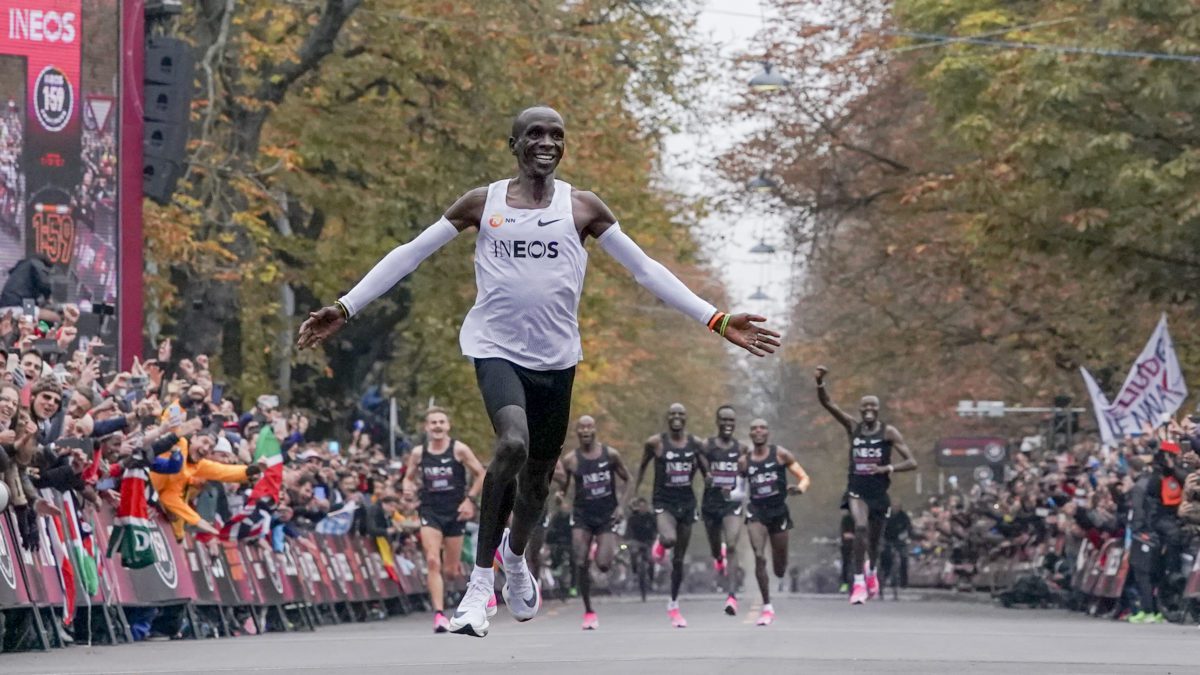Kipchoge and Hurst: champion marathoners a century apart
Breaking down the daily life of top marathoners today versus in 1899, it's clear that, while a lot has changed, the important parts remain consistent
 Photo by:
Bob Martin for The INEOS 1:59 Challenge
Photo by:
Bob Martin for The INEOS 1:59 Challenge
A German runner named Alain Güttinger recently tweeted an outline of a regular day in Eliud Kipchoge‘s life. Alongside this daily schedule, he included the same information from Len Hurst, who, like Kipchoge, was perhaps the best marathoner of his time. Kipchoge is of course actively running and chasing records today, while Hurst, a British athlete, competed as a professional marathoner in the late 19th century leading up to and following the turn of the 20th century. Despite running more than a century apart, the schedules kept by the two men are quite similar, which goes to show that, though a lot has changed since Hurst was around, the path to the top remains pretty much the same.
A day in the life of an elite marathoner. Len Hurst (1899) and Eliud Kipchoge (2020). pic.twitter.com/cdEWkmsJve
— Alain Güttinger (@alainguettinger) January 1, 2021
Hurst’s career
Hurst was born in 1871 and died in 1937. At the age of 15, he won a race and took home £10, and from that day forward, he was considered a professional runner. Because of this, he wasn’t allowed to compete at the first edition of the modern Olympics, held in Athens in 1896. Had he been able to race, he almost certainly would have won the event, but with Hurst absent, Greece’s Spyridon Louis took the gold in a time of 2:58:50.
RELATED: On this day in 2013, Eliud Kipchoge debuted in the marathon
Just a few months after the Games, Hurst won the inaugural Paris Marathon in 2:31:30, smashing Louis’s result. (It should be noted that, at the time, the marathon was normally held on courses of about 40K in length, and so Hurst’s run isn’t considered a past marathon world record). Hurst had a remarkable career, winning the Paris Marathon twice more (in 1900 and 1901), running to the 25-mile (40K) world championship crown in 1901 and the 25-mile world record in 1903 with a time of 2:32:42.

Comparing schedules
As Güttinger’s tweet notes, Hurst’s schedule comes from his 1899 season and Kipchoge’s is from 2020. Both men had early wake-up calls (5:40 a.m. for Kipchoge and 6 a.m. for Hurst), heading out for the day’s first activity right away without eating breakfast. Kipchoge goes for a 20K run to start the day, but Hurst apparently went for a “steady walk” each morning. Upon returning home, both men had breakfast next up on their schedules and some downtime.
RELATED: Malindi Elmore’s daily routine
After a short break, Hurst went back out for another walk, which eventually turned into a 5K run. He would then return home for lunch, which was followed by a nap. Similarly, Kipchoge (who at this point hasn’t had his second run of the day yet), eats and then either naps or exercises, presumably doing core or something light.
Again, Hurst walks once more, which is the main difference between his schedule and that of Kipchoge, who doesn’t have any walks penciled into his day. Hurst would walk from 3 p.m. to 4 p.m., then hit the track for “three miles spin with [a] sharp finish.” Kipchoge, too, has an evening run at 4 p.m. This is followed by evening tea and supper for both men, another walk for Hurst, some more downtime and bed before repeating the process the next morning.
https://www.instagram.com/p/CJs0QXEsg96/?utm_source=ig_web_copy_link
Why does this matter?
Hurst and Kipchoge are examples of humans with a special talent to run hard, fast and long. You need at least some innate ability to become a world champion like Hurst or to run a sub-two-hour marathon like Kipchoge. But what helped Hurst and Kipchoge far more than their natural gifts was and (in Kipchoge’s case) continues to be their discipline. Both men had early starts to the day on their schedules, both pounded the pavement for many kilometres every day and they both stuck to their respective schedules.
RELATED: How Kipchoge was chosen for Breaking2
Odds are, you probably won’t ever run as quickly as Hurst did at the Paris Marathon in 1896, and we can bet with almost 100 per cent certainty that you will never cross the finish line of a marathon while the clock still reads 1:59:xx (but if you do, wow, great job). But you can still model your training after Hurst’s and Kipchoge’s. You might not run as far, but you can be as dedicated as them. That’s the key to finding success in running, and while many things in this sport are constantly changing, discipline and hard work are two things that will always pay off.


